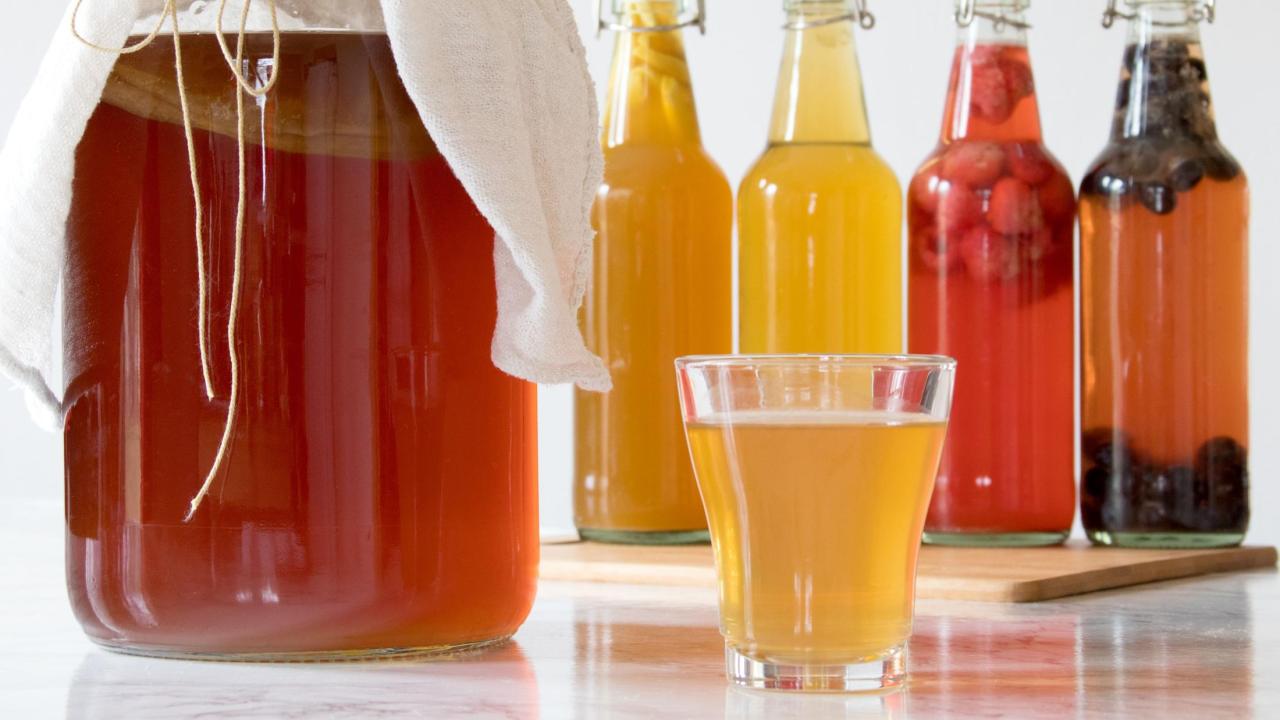
Kombucha: Myths and Facts
Kombucha is a fermented drink from East Asia that has been consumed for thousands of years. It is made by adding kombucha extract or “Scoby” to sweet black or green tea. Scoby is a living symbiotic colony of bacteria and yeast that forms a mushroom like film on top of the kombucha; also, why kombucha is called mushroom tea. The final products of fermenting sugar are acetic acid, traces of alcohol and CO2 that makes the beverage slightly carbonated. Today, prospective health benefits of Kombucha have caused an increased interest in this product; however, only a few research studies have shown that Kombucha has antimicrobial and probiotic properties.
These are some potential health benefits of kombucha:
- Like many other fermented foods, kombucha is a source of probiotics. It contains some species of lactic-acid bacteria which may have probiotic function.
- Kombucha made from green tea contains antioxidants and polyphenols. Studies show that drinking green tea helps the body burn extra calories which could lead to a potential weight loss. Green tea also helps to adjust blood cholesterol and glucose. Studies also show that green tea consumers have a decreased risk of prostate, breast, and colon cancers. Kombucha also contains a healthy dose of B vitamins. Antioxidants are natural substances that protect the body against free radicals; there are some studies suggesting that kombucha’s antioxidants have profound effects on rats, but there is not any study done on humans.
- One of the main ingredients produced in kombucha is acetic acid, which can kill many potentially harmful bacteria. Researches show that traditional kombucha had higher activity against Staphylococcus aureus and Escherichia coli than acetic acid.
- Kombucha may help prevent or reduce risk for Heart Disease, type 2 diabetes, and cancer: Rat studies show that kombucha can greatly improve HDL and reduce LDL cholesterol, slow down the digestion of carbs, also improve liver and kidney function.
- In test-tube studies, kombucha helped prevent the growth and spread of cancerous cells due to its high concentration of tea polyphenols and antioxidants. However, whether kombucha has any anti-cancer effects in people has not been confirmed.
Even though some of the health benefits of kombucha have not been proven, people still can enjoy this sweet and sour and slightly carbonated beverage in moderation. It is low in calories and because of the living cultures, normally does not have any harmful additives. The FDA says kombucha is safe when properly prepared, so be careful if you make it at home. To prevent growth of unwanted bacteria and molds, keep everything sanitary, including the equipment and your hands. After 3-4 weeks, the kombucha becomes very acidic and it is better to dilute it with juice or water.
To make kombucha at home brew 5 g of tea leaves per ¼ of a gallon of water, then add 50 g of sugar. Let the liquid cool down to room temperature, 68 F. Then add the scoby or half a cup of an already prepared kombucha. Cover the top with a piece of cloth to let the oxygen inside the container. Keep it in room temperature for 7 days. Try it to see if it has become slightly sour and carbonated. Kombucha fermentation period is typically a minimum of 3 days to a maximum of 60 days, depending on the culture being used and the temperature. To stop the fermentation process, put the kombucha in the fridge and use it within a week.